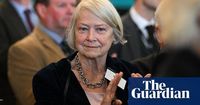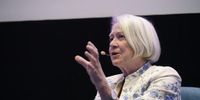A newly catalogued archive celebrating the life and work of legendary journalist Kate Adie has been unveiled at the University of Sunderland. The Kate Adie Collection documents her career as one of the BBC’s most recognisable correspondents—from the Iranian Embassy siege to conflict zones around the world.
Adie, who grew up in Sunderland, donated the archive in 2005. It includes notebooks, tapes, letters, photographs, and even fan mail. Thanks to grant funding from Archives Revealed, the University appointed a dedicated archivist, Dr. Ellie Clewlow, who has spent the past year cataloguing the collection. Her work ensures researchers, students, and the wider public can now explore the material more easily.
The official launch of the archive took place at the University’s David Puttnam Media Centre on April 10, 2025, featuring a special In Conversation event with local broadcaster and Sunderland honorary graduate Jeff Brown. During the event, Adie reflected on her journey—from her childhood in Tunstall Park to decades reporting from war zones. The pair explored highlights from her decades of reporting, giving the audience an intimate look at the stories behind the headlines and the experiences that shaped one of Britain’s most iconic journalists.
“A reporter doesn’t have much time to collect souvenirs,” she said, “but I hope it represents the extraordinarily varied stories I’ve covered—from wars to royal garden parties.” The archive includes highlights from Adie’s career, including her reporting on Tiananmen Square and her time as the BBC’s chief news correspondent. It also gives insight into her early work in local radio and life in Sunderland, where she attended Sunderland High School.
Vice Chancellor Sir David Bell described the collection as “a unique resource that will enrich learning and inspire new generations.” The archive sits alongside other special collections at the University, including the NEEMARC mining archive and the Lord Puttnam Collection. Plans are now in motion to digitise key parts of the collection, making them accessible to global audiences and local community groups alike.
Kate Adie, who holds a CBE and several honorary degrees—including one from Sunderland—also serves as the University’s Honorary Professor of Journalism. Her published works include The Kindness of Strangers and Fighting on the Home Front. The Kate Adie Collection is now available for research, teaching, and community engagement, offering an in-depth look into the legacy of one of Britain’s most fearless reporters.
In a related discussion, Adie revealed that the BBC had an unofficial league table of the most loved and despised accents in the UK. Surprisingly, the Birmingham accent topped the list of the most hated accents, while the Geordie accent was well-liked. “It is one of this country’s complex matters,” she explained, noting how accents vary hugely and how they are received varies just as much.
“Years and years ago, the BBC had an unofficial league table of the most liked and the most hated accents. The view was that some of them drove people nuts up and down the country. Geordie did pretty well. It’s liked,” Adie said, prompting laughter from the audience. When she asked them to guess the most disliked accent, a chorus of “Birmingham” followed, confirming her assertion.
Adie shared a humorous anecdote about Michael Buerk, a fellow journalist from Birmingham, who once explained why he didn’t use his accent on air: “I didn’t want death threats.” Her reflections on accents also led her to recall her early days at BBC Radio Durham, where a locally accented producer would read the news, resulting in complaints from listeners who felt it wasn't right for a news program.
Adie’s big break came in May 1980 during the Iranian Embassy siege, an event that marked a turning point in her career. “My coverage was groundbreaking but did not make me an instant star,” she stated, adding that she was sent off to cover a pools winner the next day. The archive also includes a bullet that grazed her while she was reporting from Tiananmen Square, a testament to the dangers she faced in her line of work.
Reflecting on her experiences, Adie recounted a particularly harrowing moment in Belfast when she thought she had been shot in the face. “I dropped down and assumed I was going to die,” she recalled, only to hear her cameraman shouting, “Get up! Get up! You’ve been hit in the face by a potato!”
Adie’s childhood was filled with happy memories, including “lots of tennis,” and her time at the National Youth Theatre, which she described as a large group of “randy 17- and 18-year-olds.” She fondly remembered meeting a memorably quirky girl at the theatre, joking, “I wonder what happened to Helen Mirren?”
The University of Sunderland emphasized that the cataloguing of Adie’s collection essentially “unlocks” the archive, which includes images from her first BBC job in 1968 at Durham, where her annual salary was £934 and her first story involved a pigeon race. She moved on to BBC jobs in Plymouth, Bristol, and the south coast, where she was tipped off about a double murder in Brighton. Despite capturing great footage, her news editor in Southampton was unimpressed since she was meant to cover an embroidery exhibition in Ditchling.
Adie humorously shared that she was sacked but serendipitously received a call from a national news editor who was looking for someone to fill a shift, leading her to join the London newsroom.
David Bell, the university’s vice-chancellor and chief executive, praised Adie as one of the most talented broadcasters of her, or any, generation. He announced plans to digitise key strands of the collection, stating, “By unlocking the Kate Adie collection this way, the university hopes to educate and inspire audiences, both young and old, with the accomplishments of a Sunderland-raised pioneer in her field.”
At 79, Adie continues to present From Our Own Correspondent on BBC Radio 4. When asked about the state of news reporting today, she expressed a desire to see a small radio station in every UK town providing local information. “I think every area of this country, except London, is badly reported. A lot of places are neglected, seriously,” she said, drawing from her observations of a successful model in New Zealand, where local newspapers, TV, and radio work together under one roof.





